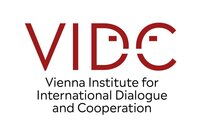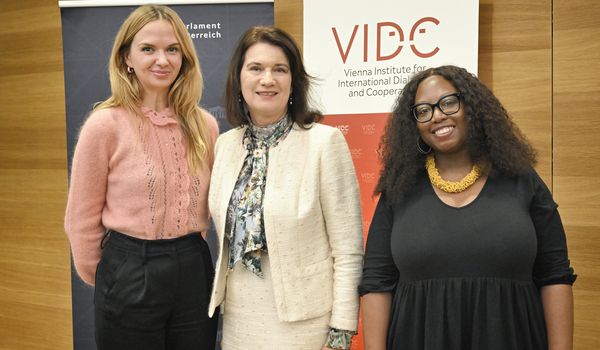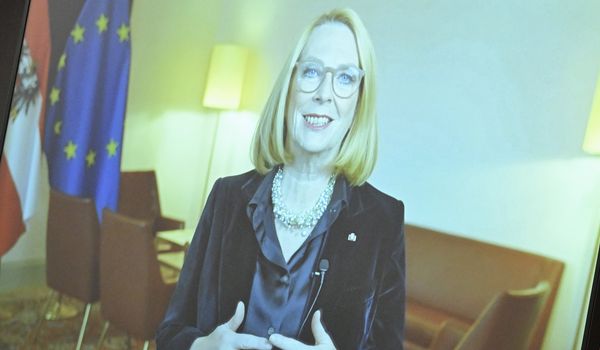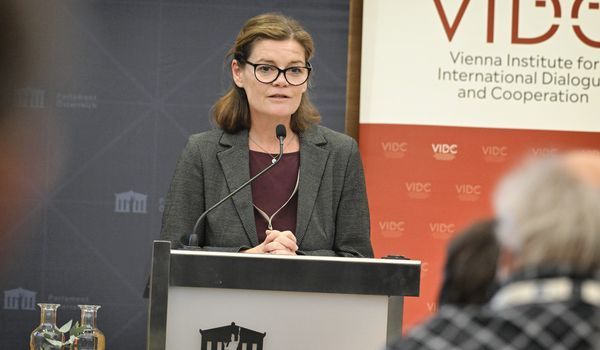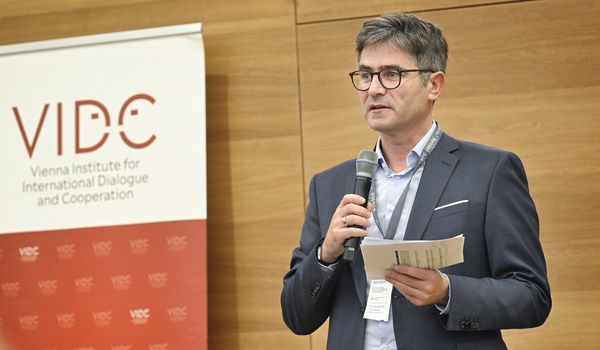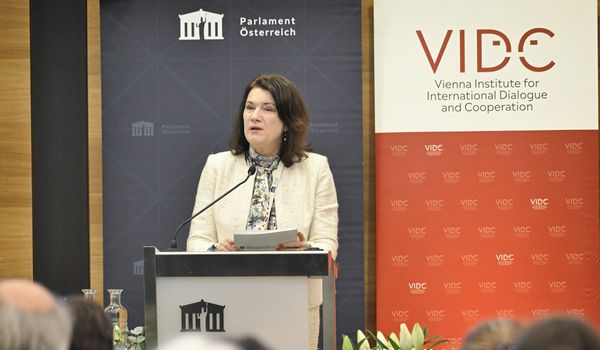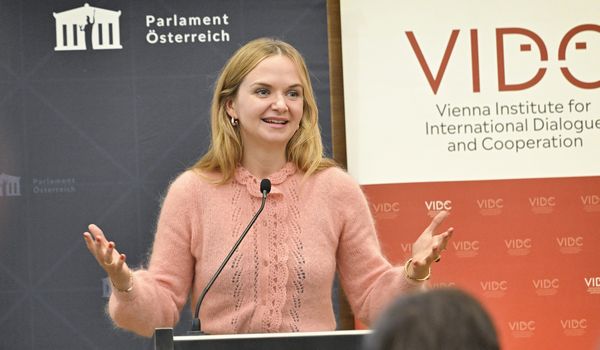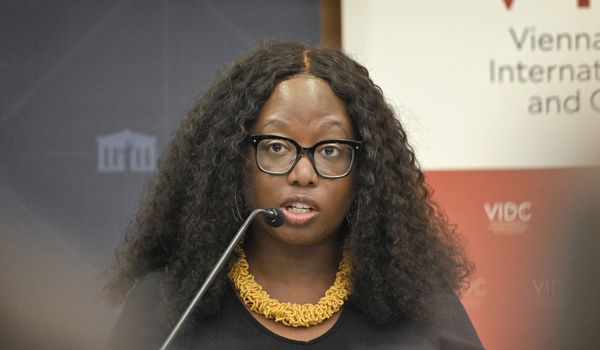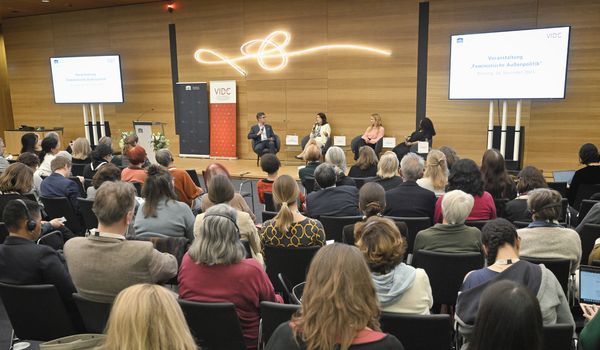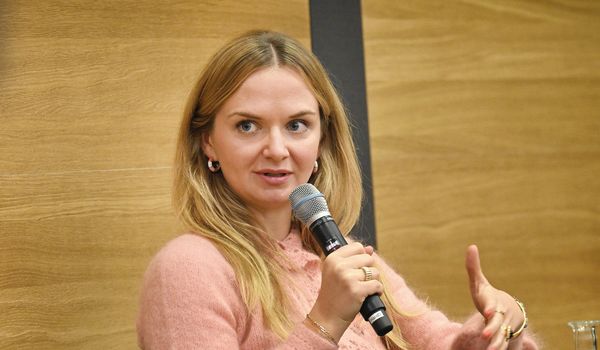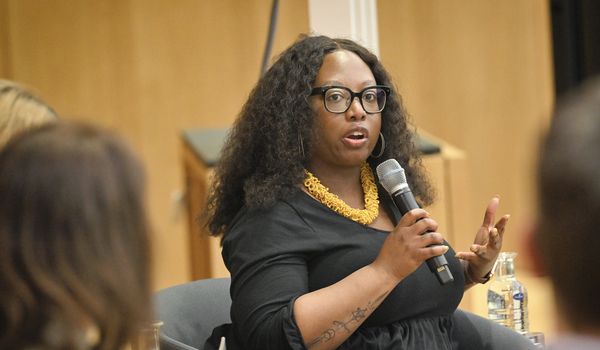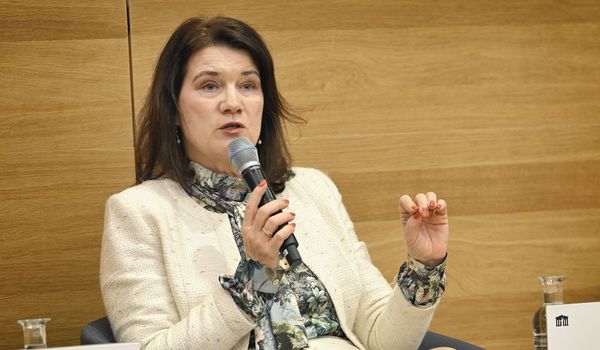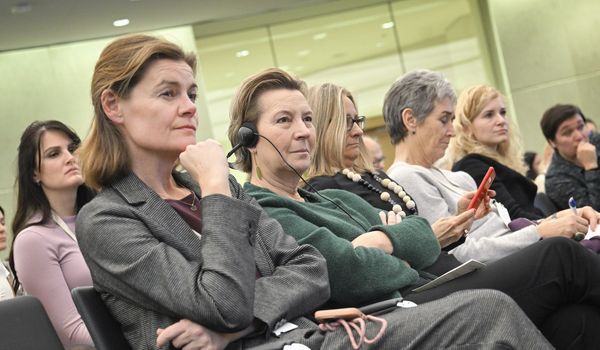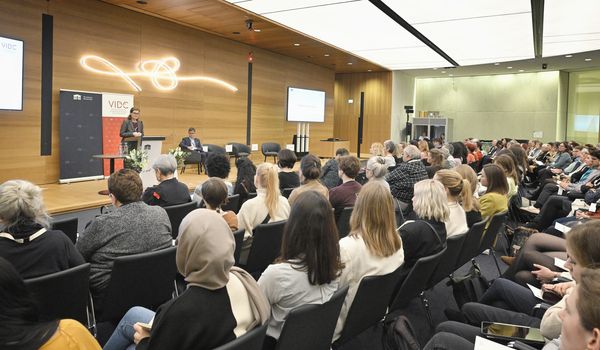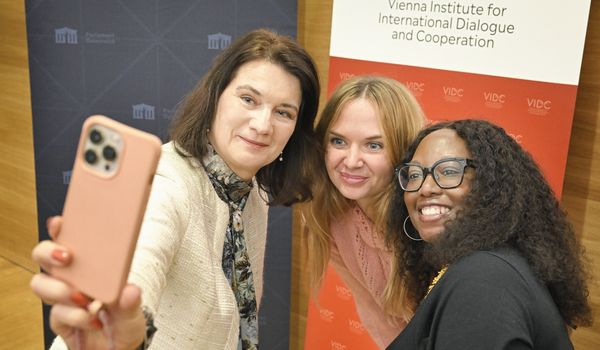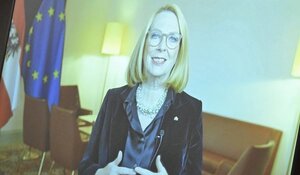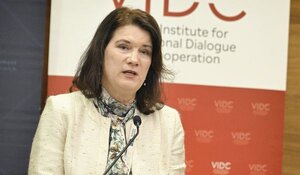Until recently, foreign policy was a marginal topic in political discourse, relegated to the sidelines of newspaper coverage. Yet, in recent years, the tides have shifted noticeably, gaining momentum fuelled by ongoing crises and escalating violence that call for new concepts and innovative approaches. Therefore, on the invitation of the Second President of the National Council, Doris Bures, the VIDC organised a panel discussion at the Austrian Parliament on 28 November 2023, where together former Swedish Foreign Minister Ann Linde, co-founder of the Centre for Feminist Foreign Policy Kristina Lunz, and scientist and academic Toni Haastrup explored the elements that define a feminist foreign policy, delving into its inherent potential and examining the reasons behind the scepticism expressed by many countries in the Global South.
"We live in a world that is becoming increasingly unpeaceful"
said Doris Bures, Second President of the National Council, in her welcoming address, emphasising the increasing lack of global peace and referring to the numerous armed conflicts and their devastating effects, particularly on women, girls and marginalised groups. As part of the 16 Days of Activism against Violence against Women and Girls, the United Nations shockingly pointed out that more women and girls were murdered worldwide in 2022 than at any time in the last twenty years. A change of perspective in foreign policy is necessary in order to meet these challenges, which are intensified by crises and climate change. A feminist foreign policy can be a useful approach here, says Doris Bures.
"We cannot achieve peace if we do not include half of the world's population."
"Women are always the most affected by violence," said former Swedish Foreign Minister Ann Linde, who gave examples of current aggression in our world, such as the Russian invasion of Ukraine, the Taliban takeover in Afghanistan, the regime's violent response to the women's revolution in Iran and the many civilian casualties in Israel and Gaza since 7 October.
"We cannot achieve peace if we do not include half of the world's population." Ann Linde's words made it clear that an important aspect of implementing a feminist policy is a systematic approach that makes it possible to analyse political measures in terms of their impact on women, girls and marginalised groups. She named the 3 Rs as an important tool for a feminist foreign policy: rights, representation and resources. This includes dismantling patriarchal norms and challenging traditional power structures.
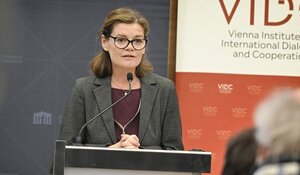
It has been proven that the participation of women in shaping peace agreements increases their chances of success by 35%, as Sybille Straubinger, Director of the VIDC, emphasised in her opening statement. This emphasises the importance of greater representation of women at negotiating tables, in political parties and in forums where decisions are made, but where they are usually chronically underrepresented. Feminist foreign policy aims to include women and marginalised groups more in decision-making and prioritise their security, in contrast to conventional foreign policy, which focuses on the state and its borders.
"Because there will only be sustainable peace if patriarchal structures are dismantled"
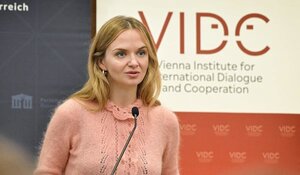
ristina Lunz began her statement by pointing out that for 4,000–6,000 years, most of humanity has been organised into patriarchal societies, in which power is based on hierarchies maintained through violence. The harsh truth of daily violence against women and marginalised groups is evident, for example, in the fact that ‘in Germany, every day a man tries to kill his partner or ex-partner, and every third day he succeeds, and every four minutes a woman experiences some form of violence such as psychological, mental or physical violence’. Kristina Lunz emphasised the strong power of the feminist movement for social change, the roots of which are located in the suffrage movement of 1915, when suffragettes formulated revolutionary demands, many of which have since been implemented, such as the founding of the UN. However, one key demand of this movement, namely demilitarisation, remains unimplemented to this day.
The Women's International League for Peace and Freedom is one of the organisations that has campaigned for disarmament from the very beginning. An important milestone in this context is the UN Declaration on the Elimination of Violence against Women and UN Security Council Resolution 1325 on Women, Peace and Security, both of which paved the way for a feminist foreign policy. "Because there will only be sustainable peace if patriarchal structures are dismantled," says Kristina Lunz.
Feminist discussions play a key role in critiquing colonial, racist, authoritarian and masculinised power
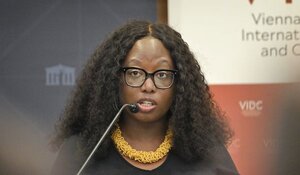
Patriarchal structures are also visible in the relation between the Global North and South. In the case of feminist foreign policies, the dominance of knowledge production by the Global North and the West is a prevailing issue. In this context, as Toni Haastrup describes it, the Global South often finds itself relegated to a supporting role, its citizens mere recipients, ‘often cast in the role of supporting character’. Over the past decade, policy architecture has evolved, yet remnants of global power hierarchies persist. To address this, policies should adopt a people-centric approach by considering issues such as land appropriation, labour exploitation and control of natural resources. Moreover, attention to state institutions and issues of power, gender control and historic structures is crucial, and integrating these priorities is essential to dismantling entrenched relations between the Global North and South. This is where feminist discussions play a key role in critiquing colonial, racist, authoritarian and masculinised power, with intersectionality highlighting the trauma experienced by the most vulnerable due to structures of oppression and discrimination.
"Feminism is not complete if it is not intersectional"

The challenge lies in sticking to one's own feminist values and priorities because, as Kristina Lunz pointed out using the example of Russia, many feminists and human rights defenders warned that Putin's anti-feminist and anti-homosexual rhetoric was an indication of the subsequent aggression against Ukraine. The inclusion of gender analysis in conflict assessments would help to recognise these signs and counteract conflicts in advance. Patriarchal structures of international power relations are also evident in the different perceptions of conflicts by politicians and the media, as Toni Haastrup demonstrated using the example of the Ukraine war and conflicts in countries such as Congo, Ethiopia ,and Sudan. This shows that solidarity is a crucial factor in bridging the gap between the Global North and South and forming a common front. "Feminism is not complete if it is not intersectional," said Toni Haastrup, because "no one is truly liberated unless everyone shares in that freedom".
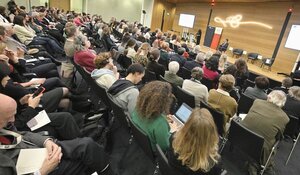
The discussion emphasised the need for a continuous process in feminist foreign policy that deals with resistance, challenges existing power dynamics, and thus contributes to the dismantling of violent global structures. It is necessary to provide sufficient resources to involve feminist civil society in this process. A feminist foreign policy encourages global solidarity and emphasises the importance of dealing with human rights violations with the aim of achieving global equality and a fairer, more peaceful world.
